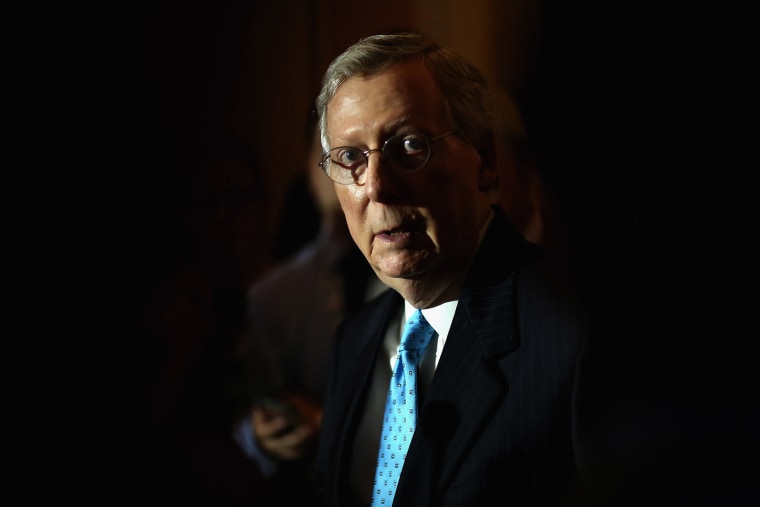For proponents of gun reforms, Senate Majority Leader Mitch McConnell (R-Ky.) is an unmovable villain standing in the way of every legislative effort to improve public safety. For opponents of reforms, the Kentucky Republican is a reliable ally, who can always be counted on to bury gun legislation regardless of merit.
Both contingents were probably a little surprised yesterday when McConnell opened the door to new legislation using rhetoric that he hasn't used before.
"Those are two items that for sure will be front and center as we see what we can come together on and pass" the Republican leader said on a Kentucky radio station, speaking about a bipartisan bill from Sens. Joe Manchin, D-Va., and Pat Toomey, R-Pa., which would expand background checks to cover online and gun show sales, and the so-called red flag law, legislation that allows courts and police to confiscate firearms from people who are believed to be a threat to themselves or others."But what we can't do, is fail to pass something. By just locking up, and failing to pass, that's unacceptable," McConnell said, marking a significant departure from his past handling of gun legislation in the wake of tragedies.
The Senate GOP leader went on to note that he'd spoken about the issue with Donald Trump, and the president is "anxious to get an outcome."
It's hard not to think of poor Charlie Brown, standing on the field, wondering if this time Lucy will actually let him kick the football without yanking it away at the last moment.
The circumstances, after all, are familiar. Mass shootings shock the national conscience and spur demands for action, Republican politicians will, in the immediate aftermath of the violence, routinely suggest they're willing to consider reforms, giving hope to progressive activists.
And then time elapses, headlines change, attention shifts, and GOP officials cooperate with groups like the NRA to ensure very little happens.
Will this time be any different? I'm reluctant to guess, though it's worth noting for context that McConnell has spent several decades standing in the way of gun reforms. I'm not aware, however, of the Kentucky senator ever saying, "What we can't do is fail to pass something."
Maybe McConnell's had a sincere change of heart; maybe he's afraid of his party losing suburban voters; maybe he wants to hand Trump a "win" on a high-profile issue.
Or perhaps the Republican leader is playing the role of Lucy, and Charlie Brown would be foolish to feel any sense of optimism.
Looking ahead, there are three possible outcomes:
1. This time really will be different. The combination of bloodshed, public demands, and shifting electoral incentives could mean Republicans are prepared for a fundamental shift in direction.
2. GOP officials will embrace a fig leaf. McConnell & Co. may not seriously consider sweeping reform measures, but they could go along with half-measures intended to give the appearance of real legislative effort. It's easy to imagine Republicans passing a "red-flag" bill, for example, calling it a day, and running campaign ads next year saying, "The public told us to pass something, so we did."
3. The door to progress will shut once Congress gets back to work. Lawmakers will return to Capitol Hill in about a month, at which point there's likely to be some bipartisan and bicameral negotiations. Between now and then, activists on both sides will have time to mobilize, and party leaders will have time to shape legislative strategies.
It's hardly implausible to think Democrats will pursue an ambitious plan, Republicans will offer far less, and after talks collapse, McConnell will hold a press conference to declare, "We were ready to act but Democrats weren't."
We'll see soon enough which of these scenarios comes to fruition.
Postscript: House Speaker Nancy Pelosi (D-Calif.) and Senate Minority Leader Chuck Schumer (D-N.Y.) yesterday issued a joint statement following separate conversations with Trump about the gun issue. It read in part, "The president gave us his assurances that he would review the bipartisan House-passed legislation and understood our interest in moving as quickly as possible to help save lives."
For what it's worth, according to the White House, Trump reviewed the House bill on background checks months ago -- and he threatened to veto it if it reached his desk. The Statement of Administration Policy remains on the White House's website.
